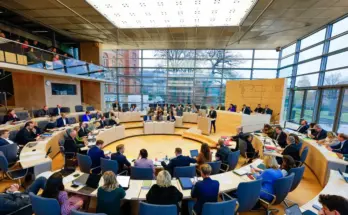The European Broadcasting Union (EBU) has announced a series of important updates to the Eurovision Song Contest voting system starting from the 2026 edition. These measures are designed to “strengthen trust, transparency and public participation,” the organization explains in a statement on Friday.
The latest editions of the competition have been characterized by the controversial presence of Israel and the massive support obtained through the popular vote, which led RTVE to request a verification of the televoting last May.
The first of these changes concerns the definition of clearer promotion rules, following Israel’s controversial actions on social networks that mobilized massive votes in favor of its candidacy abroad. The updated voting instructions “advise against disproportionate promotional campaigns… especially when they are carried out or supported by third parties, including governments or government agencies”, notes the text released by the EBU. “Contesting broadcasters and artists may not actively participate in, facilitate or contribute to third-party promotional campaigns that could influence the outcome of the vote and, as set out in the updated Code of Conduct, any attempt to improperly influence the results will lead to sanctions,” the Eurovision organizer warns.
Furthermore, starting in 2026, the maximum number of votes per payment method (whether online, SMS or phone call) will be reduced from 20 to 10 participations, making it more difficult for organized campaigns to influence the outcome of televoting.
These changes are the result of extensive consultation with EBU members following the 2025 edition. An independent consultant, commissioned by the EBU Executive Board, conducted a comprehensive review of participation, working closely with the CEOs of participating broadcasters and other international event organisers. Their recommendations coincide with the opinions of the heads of delegation and served as the basis for the adoption of measures that further strengthen the Festival’s voting system.
Another decision taken by the EBU is to recover the vote of the professional jury in the semi-final. From the 2022 edition it only participated in the final, so the qualified countries were strictly in the hands of the public. “This change aims to encourage optimal musical balance and greater diversity in the songs that qualify for the final, ensuring that high-quality works with broad artistic merit are recognized alongside those of great popularity,” comments the European organisation. The number of jurors will increase from 5 to 7 and the range of professional profiles from which to select them will be expanded, including music journalists and critics, music teachers, creative professionals such as choreographers and directors, and leading figures in the music industry. To attract a younger audience, each country’s jury will include at least two members aged between 18 and 25. “All jury members must sign a formal declaration confirming that they will vote independently and impartially, that they will not coordinate with other jury members before the competition and that they will be aware of the use they will make of their social networks, i.e. that they will not share their preferences on their profiles,” clarifies the EBU.
Finally, the organization will continue to expand security systems that detect and prevent fraudulent or coordinated voting activity. “These measures are designed to focus attention where it should be: on music, creativity and connection,” said Martin Green, the new director of the festival, who assures that the 2025 edition “has returned a valid and solid result”, but believes that these changes “will help provide greater guarantees and increase participation so that fans can be sure that every vote counts and every voice is heard”.
Members meeting at the EBU General Assembly in early December will need to consider these range of measures and safeguards and decide whether they are sufficient to address their concerns about participation, without putting the issue to a vote. The full list of stations participating in next year’s competition will be published before Christmas.
In addition to the changes announced this Friday, the EBU assures that it will strengthen the application of its current rules “to prevent any misuse of the competition, for example through song lyrics or staging”.



